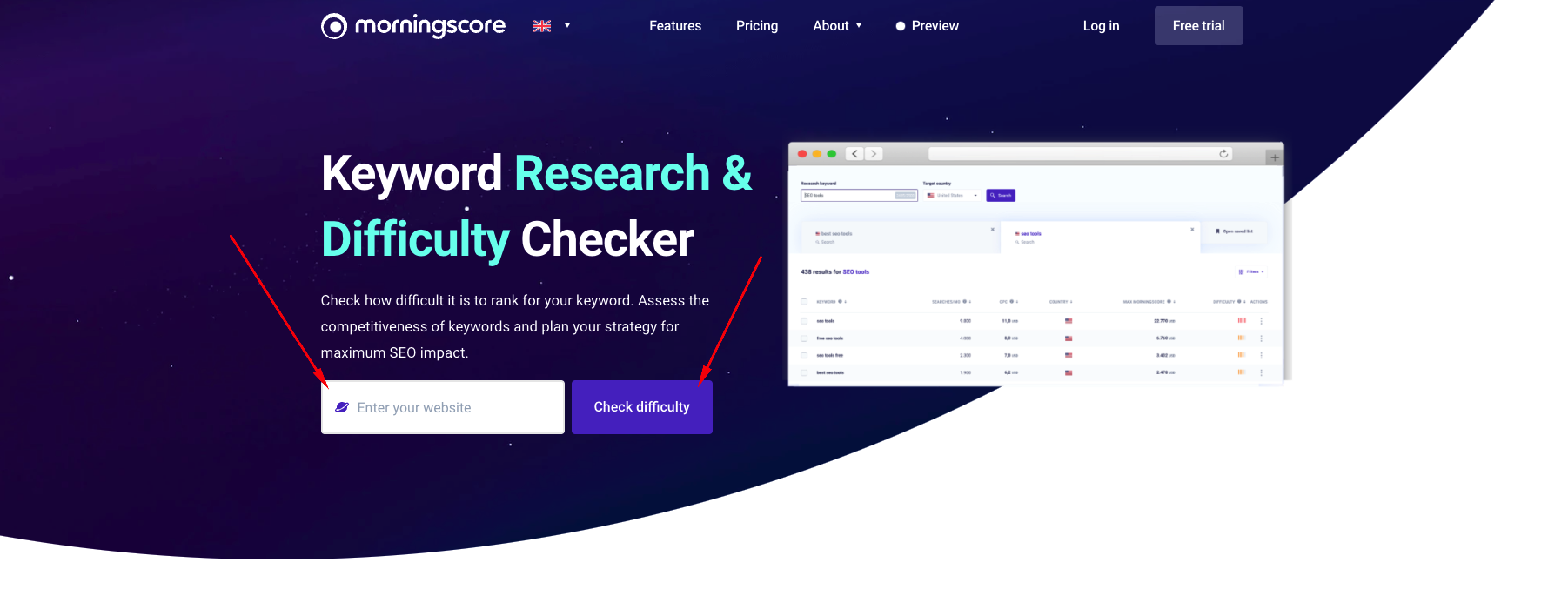Keyword Difficulty is an SEO metric that indicates the level of difficulty in achieving a top ranking for a particular keyword on Google or any other search engine.
Find the most promising keywords by assessing their difficulty and alternatives
Check how difficult it is to rank for your keyword. Assess the competitiveness of keywords and plan your strategy for maximum SEO impact.
Sign up now. Free trial. Full access for 14 days. Rankings is automatically crawled (1 min). Get info on all keywords.
Find the most promising keywords by assessing their difficulty and alternatives
Choose your keywords based on data, not gut feeling
Find the easiest keywords to rank for, or put extra effort into ranking for the difficult ones

Keyword Difficulty is an SEO metric that indicates the level of difficulty in achieving a top ranking for a particular keyword on Google or any other search engine.
You can enter your website’s URL into Morningscore, wait approximately 1 minute until we scan your website, and then go to the ‘Keyword research’ tab.
Type in the keyword you have in mind and check how difficult it is to rank high for your specific keyword.
We gather our data 'on the fly' from various sources to ensure its freshness and higher accuracy. More information about our data quality is provided in this article.
We estimate each keyword's difficulty based on its search volume (searches per month) and cost per click (CPC) of the keyword in Google Ads.
Depending on your subscription plan, you can do a keyword research x amount of times every month, which in the end, results in how many keywords you'll see the difficulty for. This varies from 25 with the LITE plan to 2.500 with the PREMIUM plan. When you conduct a keyword research several keywords might appear from that, and they will all have a keyword difficulty.
When starting with SEO, aim for less competitive, long-tail keywords that match your content, especially if your site is new. Morningscore can help you understand keyword difficulty and show you the amount of searches on Google. It does not make sense to optimize your page for a keyword that nobody is searching for. Remember, the quality of your content is key to ranking well, so focus on relevance and search intent.
Yes, keyword difficulty can change over time due to shifts in search trends, user behavior, competitor strategies, or updates to search engine algorithms. As interest in a specific keyword grows or more websites start targeting the same keywords, the competition for ranking can increase, affecting keyword difficulty.
To increase your chances of ranking higher for difficult keywords, first enhance your content's depth and quality, and then build a strong backlink profile. Regularly updating your site with relevant, valuable information can also help. Engaging with your audience through social media and other platforms that drive traffic to your website can boost your site's authority, making it more competitive for those difficult keywords.
Long-tail keywords are typically less competitive than short-tail ones because they are more specific so they attract fewer but more focused searches. This specificity means fewer websites compete for them, making it easier for you to rank higher if you have well-matched, quality content.